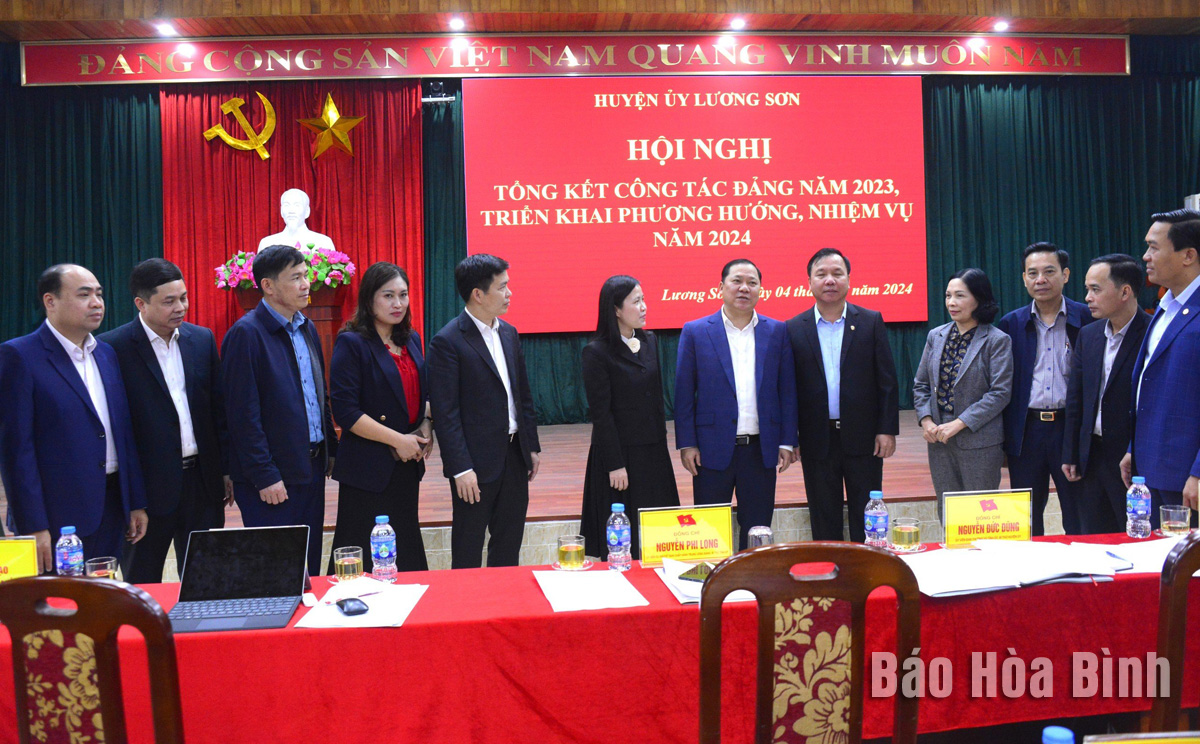
Nguyen Phi Long, Secretary of the Party Committee of Hoa Binh province, attended a meeting of Luong Son district’s Party organisation on January 4, which reviewed Party affairs in 2023 and set out tasks for this year.
Nguyen Phi Long, Secretary of the provincial Party Committee, and other
officials at the meeting.
Last year, under the leadership of the Party organisation, Luong Son maintained
its role and position as an economic engine of Hoa Binh province, according to
a report delivered at the meeting.
The locality fulfilled up to 14 out of the 15 targets assigned by the Party
organisation, with State budget collection reaching 930 billion VND (38.15
million USD), surpassing the estimate by 158.33%, and up 59.6% year-on-year. As of the end of 2023, its urbanisation rate was estimated at 52.2%, up 3.3%
year-on-year.
However, limitations still remain in the fields of inspection, land, natural
resources and environmental management, and site clearance for some products,
the report said.
In his
remarks, Long asked the Party organisation to step up instructions in order to
satisfy criteria set for a 4th-tier urban area in 2024, striving to achieve the
township status in 2025. In the economic sphere, he urged Luong Son to focus on land clearance for major
key projects of the province and the district, create optimal conditions for
investors to soon begin a number of major projects, and intensify inspections
over the management and use of natural resources. Besides, the district needs to further preserve and uphold cultural traits of
ethnic groups, and promote its
image, he said.
On this occasion, the Party organisation honoured collectives and individuals
for their outstanding performance in fulfilling political tasks in 2023.
The Standing Board of the Hoa Binh provincial Party Committee has agreed in principle on a proposal by the Standing Board of the Party Committee of Hoa Binh city to gather feedback on the city’s 1:2000 zoning plan, which forms part of its broader urban development strategy.
Hoa Binh province has made notable progress in public administration reform and digital government development, with the satisfaction index among citizens and businesses reaching over 84%, according to recent government evaluations.
Thanks to great efforts by local authorities in recent times, the governance and public administration performance of Mai Chau district has been significantly improved.
In the afternoon of June 6, the Party Committee, the People's Council, the People's Committee and the Fatherland Front of Lac Son district solemnly held a meeting to celebrate the 139th anniversary of the district's founding (1886–2025) and the 79th anniversary of the establishment of the district's Party Committee (1946–2025). There was the attendance of Mr. Bui Van Thang, the Vice Chairman of the Provincial People's Council; Mr. Quach Tat Liem, the Vice Chairman of the Provincial People's Committee; Ms. Dang Bich Ngoc, the Deputy Head of the National Assembly Delegation of the province; as well as the former leaders of the province and district through various periods, who are the natives of the district.
Implementing the Politburo’s Resolution No. 57-NQ/TW on breakthroughs in science – technology, innovation, and digital transformation is a golden opportunity for the northern mountainous province of Hoa Binh to renew growth model, improve competitive edge and shorten digital gap.
Resolution 57-NQ/TW, issued by the Politburo on December 22, 2024, identifies sci-tech, innovation, and digital transformation as strategic breakthroughs to build a developed and prosperous nation. In Hoa Binh province, this spirit is not just a slogan, it’s being put into action through concrete initiatives that form a "new development triangle”: digital citizenship, digital economy, and digital administration.



